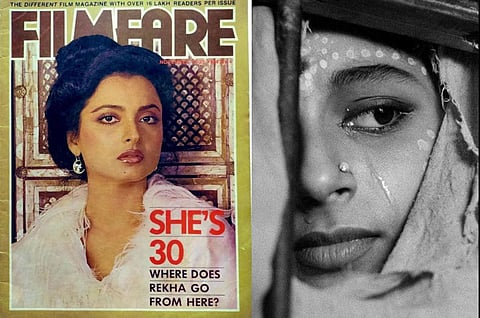
- HOMEGROWN WORLD
- #HGCREATORS
- #HGEXPLORE
- #HGVOICES
- #HGSHOP
- CAREERS
- ABOUT US
- CONTACT US

"She’s 30, where does Rekha go from here?"
Read the headline of Filmfare magazine back in 1984. This statement reflected the shared views of most individuals around the country who questioned the future of an actress barely past a quarter of her life. As youth and beauty are major markers of feminine success, one felt bound to question the relevance of a ‘fading’ figure. Especially if her work is so closely tied to physical appearance, acting as an asset in personal marketability.
Many young actresses of the 80's and 90’s diminished from the big screen almost overnight due to the ‘curse’ of ageing. This contrasted with the reality of men who were still leading profitable films near their sixties! ‘I'll get older, but your lovers stay my age’ a sight perfectly summed up in Taylor Swift’s track ‘All Too Well’.
We were all once well acquainted with tabloids publishing degrading pieces critiquing any signs of ageing on female actresses as soon as they approach 30. The women mentioned in these articles were accomplished and had contributed much to the world with their work. However, the subtle and constant categorising by age, made most feel like they are approaching some expiration date further impacting their confidence.
Beyond films this phenomenon remained consistent in other fields as well, women around the age of 30 were deemed as disposable and easily replaceable. Many believe that this was due to the connotations of gendered duties imposed on them. Around that age you are expected to raise children without the baggage of any distractions getting in the way of the assigned job.
Present day advice to ‘hide your age’ by not stating years of experience in a cover letter or resume is rooted in a similar ideology, taking unique forms in every generation. While ageism is a reality for most after a certain point however, for women an early onset of discrimination was seen which was also much more severe.
As reporter Kelly Reeves stated, ‘Women get the double whammy: Ageism and sexism’, burdened by a few fine lines and preconceived notions of menopause. Pressuring most into the endless cycle of anti-ageing procedures to remain young and attractive in order to be employed. However, if one actually thinks about it, is the age of 30 even close to these presumptions in any way?
Nevertheless, the situation seems to be changing gradually, as women across job markets continue to flourish way past the supposed year finish line. Actresses like Neena Gupta are starring in compelling storylines at the age of 63 capturing her as a nuanced being with many more challenges than the assumed fear of ageing.
We are way past the time when older women were typecast as witches and crones or the evil mother-in-law as depicted in Hindi films. This allows for women across the spectrum of age to foster a relationship of mentorship rather than a polarising equation in the fear of getting replaced by someone younger. As women beyond 30 are no longer seeking the fountain of youth and vitality by embracing the period of life in full bloom, we can now look forward to a well-rounded experience of every phase.
If you enjoyed reading this, we also suggest:
Abhinit Poddar’s Art Project Satirises Mainstream Fashion's Empty Sustainability Promises
Cultural Confluence: When Scotland Met Japan At A Homegrown Ltd Edition Streetwear Drop
A Homegrown Documentary Photoseries Capturing The Lives Of Karnataka's Fisherwomen
